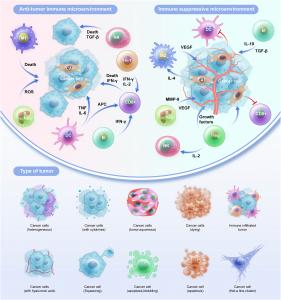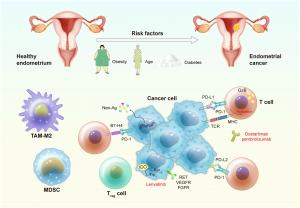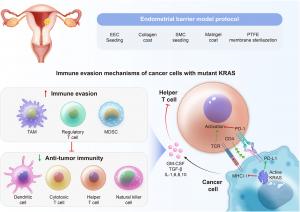Unveiling the Role of Tumor-Infiltrating Immune Cells in Endometrial Carcinoma
SHANNON, CLARE, IRELAND, March 10, 2025 /EINPresswire.com/ -- A new review article published in Genes & Diseases sheds light on the complex molecular mechanisms through which tumor-infiltrating immune cells regulate endometrial carcinoma (EC). As one of the most prevalent gynecological cancers, EC continues to challenge researchers and clinicians due to its dynamic interaction with the immune microenvironment. This comprehensive review presents crucial insights into how immune cells influence tumor progression and how immune evasion strategies enable cancer cells to thrive.
The tumor microenvironment in EC consists of various immune cell populations, including T cells, B cells, macrophages, natural killer cells, and dendritic cells, each playing distinct roles in either controlling or promoting tumor growth. A major focus of the review is on immune checkpoint pathways, such as PD-1/PD-L1, which tumors exploit to suppress the immune response. These pathways create an immunosuppressive environment, preventing the body's natural defense mechanisms from eliminating cancer cells.
Additionally, the review discusses the role of cytokines, chemokines, and signaling pathways in shaping the immune landscape of EC. Key immune players like macrophages and regulatory T cells contribute to immune suppression, further complicating treatment efforts. The review highlights the clinical implications of understanding these molecular interactions, emphasizing how immunotherapies can be tailored to counteract immune evasion tactics and improve patient outcomes.
By dissecting the intricate immune-tumor interactions, the study underscores the importance of personalized medicine in treating EC. It calls for further research into biomarkers that can predict response to immunotherapies and strategies to overcome resistance to checkpoint inhibitors. The findings provide a strong foundation for future advancements in targeted cancer therapies.
This review offers a comprehensive understanding of how immune regulation impacts tumor progression. As research continues to evolve, these insights pave the way for innovative treatment strategies, ultimately improving outcomes for patients battling endometrial carcinoma.
# # # # #
Genes & Diseases publishes rigorously peer-reviewed and high quality original articles and authoritative reviews that focus on the molecular bases of human diseases. Emphasis is placed on hypothesis-driven, mechanistic studies relevant to pathogenesis and/or experimental therapeutics of human diseases. The journal has worldwide authorship, and a broad scope in basic and translational biomedical research of molecular biology, molecular genetics, and cell biology, including but not limited to cell proliferation and apoptosis, signal transduction, stem cell biology, developmental biology, gene regulation and epigenetics, cancer biology, immunity and infection, neuroscience, disease-specific animal models, gene and cell-based therapies, and regenerative medicine.
Scopus CiteScore: 7.3
Impact Factor: 6.9
# # # # # #
More information: https://www.keaipublishing.com/en/journals/genes-and-diseases/
Editorial Board: https://www.keaipublishing.com/en/journals/genes-and-diseases/editorial-board/
All issues and articles in press are available online in ScienceDirect (https://www.sciencedirect.com/journal/genes-and-diseases ).
Submissions to Genes & Disease may be made using Editorial Manager (https://www.editorialmanager.com/gendis/default.aspx ).
Print ISSN: 2352-4820
eISSN: 2352-3042
CN: 50-1221/R
Contact Us: editor@genesndiseases.com
X (formerly Twitter): @GenesNDiseases (https://x.com/GenesNDiseases )
# # # # # #
Reference
Silu Ding, Yingying Hao, Yue Qi, Heng Wei, Jin Zhang, Hui Li, Molecular mechanism of tumor-infiltrating immune cells regulating endometrial carcinoma, Genes & Diseases, Volume 12, Issue 3, 2025, 101442, https://doi.org/10.1016/j.gendis.2024.101442
Genes & Diseases Editorial Office
Genes & Diseases
+ +86 23 6571 4691
editor@genesndiseases.com
Legal Disclaimer:
EIN Presswire provides this news content "as is" without warranty of any kind. We do not accept any responsibility or liability for the accuracy, content, images, videos, licenses, completeness, legality, or reliability of the information contained in this article. If you have any complaints or copyright issues related to this article, kindly contact the author above.



